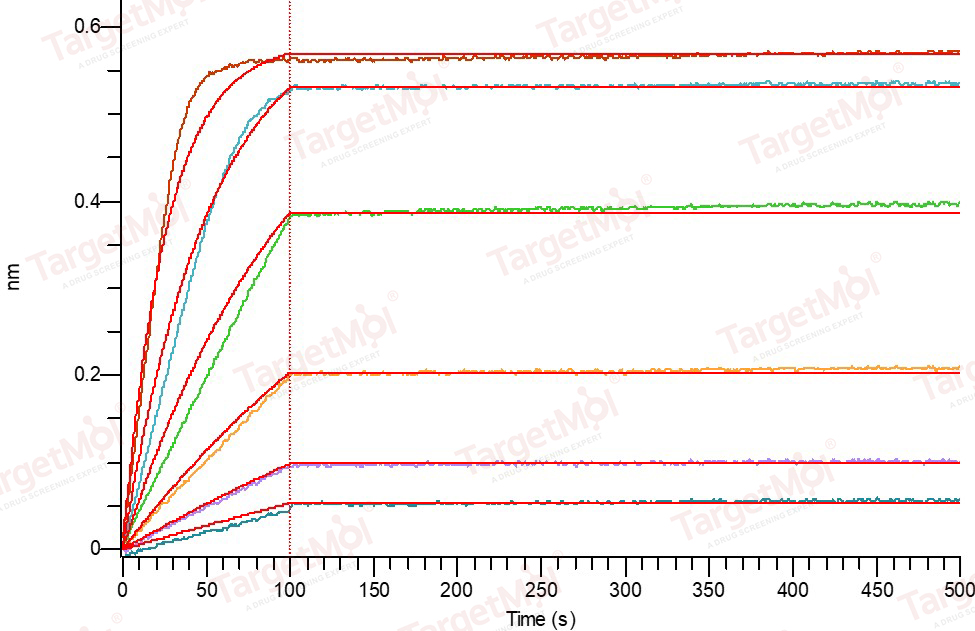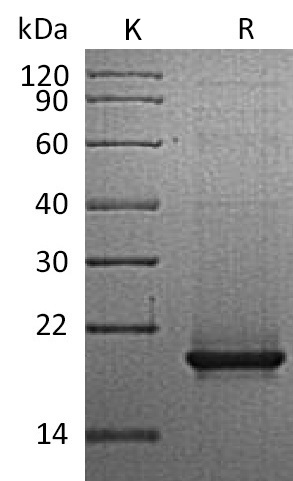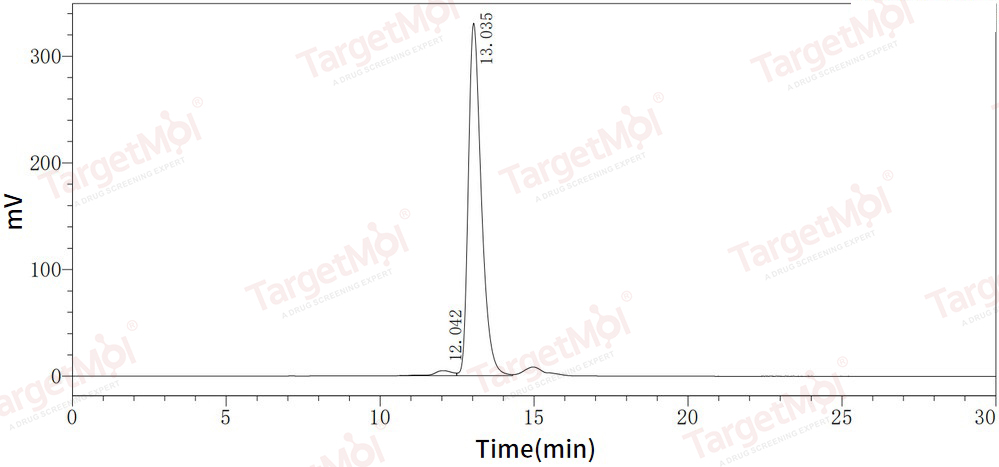 Your shopping cart is currently empty
Your shopping cart is currently empty
RANKL/TNFSF11/CD254 Protein, Human, Recombinant (E. coli)
CD254, also known as RANKL, TNFSF11, TRANCE, OPGL and ODF, is a type II membrane protein of the tumor necrosis factor (TNF) superfamily, and affects the immune system and control bone regeneration and remodeling. RANKL is the ligand of nuclear factor (NF)-κB (RANK). When RANKL binds to RANK, it will undergo trimerization and then bind to an adaptor molecule TNF receptor-associated factor 6 (TRAF6). This results in the activation of several downstream signaling cascades, including the NFκB, mitogen-activated protein kinases (MAPK), activating protein 1 (AP-1), and nuclear factor of activated T cells (NFATc1), resulting in the formation of multinucleated bone-resorbing osteoclasts. RANKL is widely expressed in skeletal muscle, thymus, liver, colon, small intestine, adrenal gland, osteoblast, mammary gland epithelial cells, prostate and pancreas.

RANKL/TNFSF11/CD254 Protein, Human, Recombinant (E. coli)
| Pack Size | Price | USA Warehouse | Global Warehouse | Quantity |
|---|---|---|---|---|
| 5 μg | $74 | 7-10 days | 7-10 days | |
| 10 μg | $118 | In Stock | In Stock | |
| 20 μg | $187 | 7-10 days | 7-10 days | |
| 50 μg | $350 | 7-10 days | 7-10 days | |
| 100 μg | $578 | 7-10 days | 7-10 days | |
| 200 μg | $965 | 7-10 days | 7-10 days | |
| 500 μg | $1,900 | 7-10 days | 7-10 days | |
| 1 mg | $2,730 | 7-10 days | 7-10 days |
Product Information
| Biological Activity | Loaded Recombinant Human OPG-Fc on Pro A Biosensor, can bind Human RANKL with an affinity constant of 1.83 pM as determined in BLI assay. (Regularly tested)  |
| Description | CD254, also known as RANKL, TNFSF11, TRANCE, OPGL and ODF, is a type II membrane protein of the tumor necrosis factor (TNF) superfamily, and affects the immune system and control bone regeneration and remodeling. RANKL is the ligand of nuclear factor (NF)-κB (RANK). When RANKL binds to RANK, it will undergo trimerization and then bind to an adaptor molecule TNF receptor-associated factor 6 (TRAF6). This results in the activation of several downstream signaling cascades, including the NFκB, mitogen-activated protein kinases (MAPK), activating protein 1 (AP-1), and nuclear factor of activated T cells (NFATc1), resulting in the formation of multinucleated bone-resorbing osteoclasts. RANKL is widely expressed in skeletal muscle, thymus, liver, colon, small intestine, adrenal gland, osteoblast, mammary gland epithelial cells, prostate and pancreas. |
| Species | Human |
| Expression System | E. coli |
| Tag | Tag Free |
| Accession Number | O14788 |
| Synonyms | tumor necrosis factor ligand superfamily member 11,TNFSF11,Receptor activator of nuclear factor κ-B ligand,Receptor activator of nuclear factor kappa-B ligand,RANK L,Osteoclast differentiation factor,OPGL,ODF,CD254 |
| Amino Acid | Ile140-Asp317 |
| Construction | Ile140-Asp317 |
| Protein Purity | Greater than 90% as determined by reducing SDS-PAGE. Greater than 90% as determined by SEC-HPLC.   |
| Molecular Weight | 20 KDa (reducing condition) |
| Endotoxin | < 0.1 ng/µg (1 EU/µg) as determined by LAL test. |
| Formulation | Lyophilized from a solution filtered through a 0.22 μm filter, containing 20 mM Tris-HCl, 150 mM NaCl, pH 8.0. |
| Reconstitution | Reconstitute the lyophilized protein in distilled water. The product concentration should not be less than 100 μg/ml. Before opening, centrifuge the tube to collect powder at the bottom. After adding the reconstitution buffer, avoid vortexing or pipetting for mixing. |
| Stability & Storage | Lyophilized powders can be stably stored for over 12 months, while liquid products can be stored for 6-12 months at -80°C. For reconstituted protein solutions, the solution can be stored at -20°C to -80°C for at least 3 months. Please avoid multiple freeze-thaw cycles and store products in aliquots. |
| Shipping | In general, Lyophilized powders are shipping with blue ice. Solutions are shipping with dry ice. |
| Research Background | CD254, also known as RANKL, TNFSF11, TRANCE, OPGL and ODF, is a type II membrane protein of the tumor necrosis factor (TNF) superfamily, and affects the immune system and control bone regeneration and remodeling. RANKL is the ligand of nuclear factor (NF)-κB (RANK). When RANKL binds to RANK, it will undergo trimerization and then bind to an adaptor molecule TNF receptor-associated factor 6 (TRAF6). This results in the activation of several downstream signaling cascades, including the NFκB, mitogen-activated protein kinases (MAPK), activating protein 1 (AP-1), and nuclear factor of activated T cells (NFATc1), resulting in the formation of multinucleated bone-resorbing osteoclasts. RANKL is widely expressed in skeletal muscle, thymus, liver, colon, small intestine, adrenal gland, osteoblast, mammary gland epithelial cells, prostate and pancreas. |
Dose Conversion
Calculator
Tech Support
| Size | Quantity | Unit Price | Amount | Operation |
|---|

Copyright © 2015-2026 TargetMol Chemicals Inc. All Rights Reserved.



